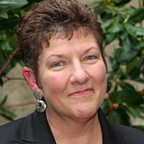A High School Writing Center in Istanbul
by Tom Fox, National Writing Project
Imagine my surprise at being half-way around the world to visit my son and getting a message in the Write Now Teacher Studio from Jeff Gibbs, introducing himself as Director of the Hisar Writing Center, having heard I was in town. “Town” is the immense, complicated, and enthralling city of Istanbul, a “town” of 17 million or more.
Jeff and I made a date, and we joined up at his school.
Though the security outside the school was definitely tighter than American schools, once inside, I felt at home. Jeff’s writing center, as you can see from the photo above, is a beautiful space, well-lighted and adorned with student art. I asked Jeff to tell me the story of the center. He began at Hisar School as an English teacher. A writer himself, he knew from his own practice the value and power that writing can have. When his administrator asked if anyone was interested in starting a writing center, Jeff and colleague and co-founder Stephen Freer said yes. Jeff and Stephen formed a team with Ned Entrikin and Banu Aldemir as essential collaborators and took on the challenge. The challenge became even more challenging as Jeff launched the center through earthquakes and the world-wide pandemic!
Jeff had found the National Writing Project and the Secondary School Writing Center Association through his early research on writing centers. He was clearly familiar with some of the standard challenges of writing centers: ongoing training for writing consultants, resisting remedial definitions of centers, and garnering solid support from administrators and faculty. We had much to talk about.
On the day I visited Jeff’s center, writing consultants were given unmarked drafts of papers from a class that was studying climate change. Jeff had consulted with the instructor beforehand. Each writing consultant (there are 40 total) was given a different paper. All the papers were from the same instructor who sought out the center to help with this writing assignment. The writing consultants had approximately 20–30 minutes to read and prepare a session with the student authors. At this time, Jeff reminded students of the basic principles of the Hisar Writing Center:
When the students came in, they sat with the consultant who had read their paper. The sessions were focused, helpful, and efficient. The writing consultants were thoroughly prepared and ready to work and the students were eager to talk about their writing. The center began to buzz with the beautiful noise of students talking all at once.
This method answers almost all the challenges listed above. Writing consultants had the time and the support to prepare focused questions and comments. All students were served, not just students who struggle with writing. Writing consultants benefitted from the time and support during the first part of the hour. Plus, this method has the bonus of making positive connections with instructors by knowing in advance what the writing goals of the assignment are and supporting students in reaching those goals.
For me, however, the most exciting part of the Hisar Writing Center’s work is the yearly publications of student writing and art. These books are beautifully edited and published. They caught the attention of the school’s administrators and publicized the skills of Hisar’s students. What do students write about in Istanbul? In the first published book, Origin Stories, students write about the history of Turkish language policy, including a critique of the 1928 “Citizens, Speak Turkish” campaign. Another student writes about the unsavory history of bridal bouquets, showing that the Church’s wariness of bathing had resulted in “potent body odor,” which the bouquets were meant to mask. Many of the students at Hisar have fascinating lives, which make the personal essay section gripping. One student discovers that her uncle was deeply involved in the Vietnam war as a spy. Many tell the story of being multicultural in a nationalist country — Mongolian, Iraqi, Kurdish, Jewish, Armenian, Greek. Students did not shy away from critiques about prejudice or historical atrocities.
The second book, S.T.E.A.M. Punks, focuses on how science is learned through writing and art. I was amazed at the topics and the knowledge that Hisar students have. There were essays on the “Math of the Moonlight Sonata,” “The Historical Progression of Trigonometry.” One section is devoted to call to action letters about climate change that reference local issues and projects, climate change statistics and facts, and advocate for change.
One of my favorite essays, “The Double-Edged Sword of Nanotechnology” is one of several that looks at ironies of technological development, showing how nanotechnology’s promise in the field of medicine, but also shows the medical harm from “free nanoparticles.” Another essay, on grapheme examines the irony of a carbon-based material that could be the key to solving climate change. These essays are engagingly written. For instance, the lead in “Universality: Complex and Chaotic Systems” certainly encourages reading the whole: “How is it that proteins in chicken retina, bus arrivals at stops at Mexico, Rietmann’s Zeta Function, proportions of amounts of words we daily use, and the neutron scattering of a Uranium-238 nuclei are correlated?” Other sections include fascinating interviews with engineers, a section on the sciences of the mind and society.
These publications showed the tangible results of the writing instruction of the school, with the Writing Center itself being, as it should be, the “center.” Of course, administrators were impressed and so were parents and families. The quality is astonishingly high and help to integrate writing instruction across disciplines. For me, reading the essays was a joy, providing a solid model of how students can take on the voice and identity of public intellectuals. We have a lot to learn from the Hisar Writing Center. Jeff and his colleagues are eager to learn about how other international school-based writing centers function.
